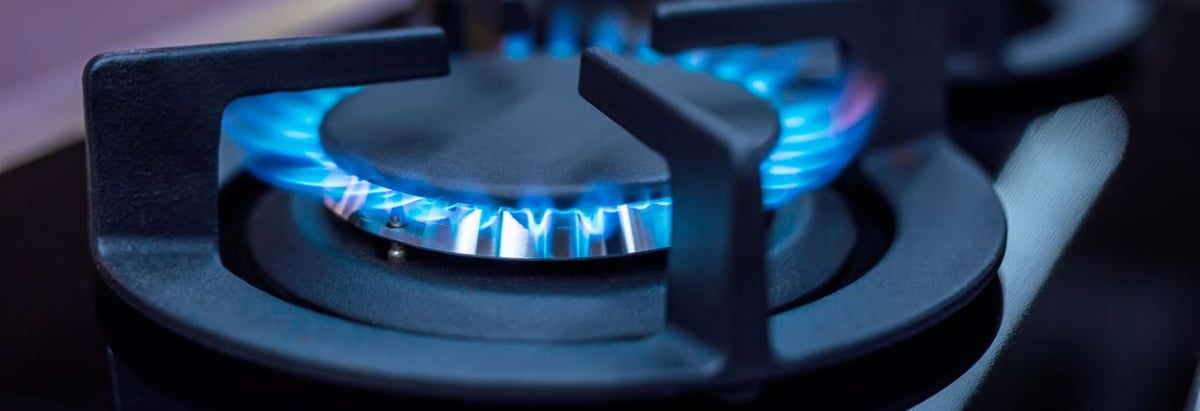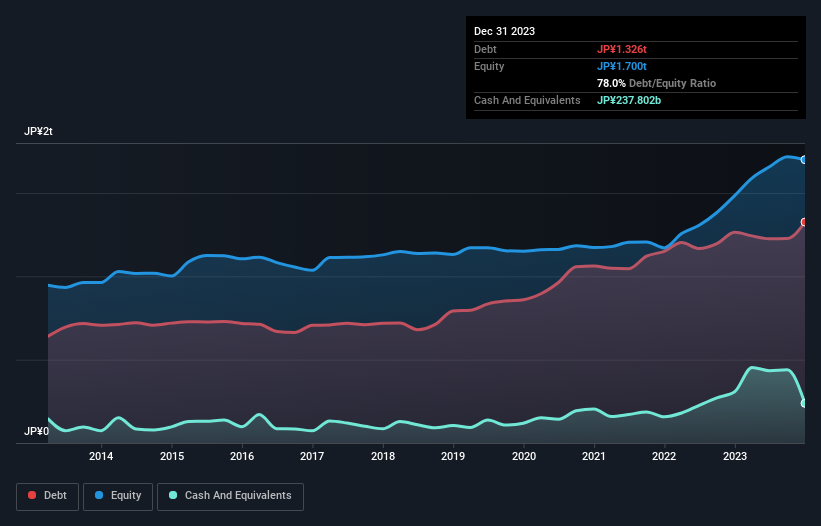
Some say volatility, rather than debt, is the best way to think about risk as an investor, but Warren Buffett famously said that 'Volatility is far from synonymous with risk.' So it seems the smart money knows that debt - which is usually involved in bankruptcies - is a very important factor, when you assess how risky a company is. As with many other companies Tokyo Gas Co.,Ltd. (TSE:9531) makes use of debt. But should shareholders be worried about its use of debt?
When Is Debt Dangerous?
Debt and other liabilities become risky for a business when it cannot easily fulfill those obligations, either with free cash flow or by raising capital at an attractive price. In the worst case scenario, a company can go bankrupt if it cannot pay its creditors. However, a more frequent (but still costly) occurrence is where a company must issue shares at bargain-basement prices, permanently diluting shareholders, just to shore up its balance sheet. Having said that, the most common situation is where a company manages its debt reasonably well - and to its own advantage. When we examine debt levels, we first consider both cash and debt levels, together.
View our latest analysis for Tokyo GasLtd
How Much Debt Does Tokyo GasLtd Carry?
As you can see below, at the end of December 2023, Tokyo GasLtd had JP¥1.33t of debt, up from JP¥1.26t a year ago. Click the image for more detail. However, it also had JP¥237.8b in cash, and so its net debt is JP¥1.09t.

How Strong Is Tokyo GasLtd's Balance Sheet?
We can see from the most recent balance sheet that Tokyo GasLtd had liabilities of JP¥708.3b falling due within a year, and liabilities of JP¥1.49t due beyond that. Offsetting these obligations, it had cash of JP¥237.8b as well as receivables valued at JP¥412.6b due within 12 months. So its liabilities total JP¥1.55t more than the combination of its cash and short-term receivables.
When you consider that this deficiency exceeds the company's JP¥1.34t market capitalization, you might well be inclined to review the balance sheet intently. In the scenario where the company had to clean up its balance sheet quickly, it seems likely shareholders would suffer extensive dilution.
We measure a company's debt load relative to its earnings power by looking at its net debt divided by its earnings before interest, tax, depreciation, and amortization (EBITDA) and by calculating how easily its earnings before interest and tax (EBIT) cover its interest expense (interest cover). This way, we consider both the absolute quantum of the debt, as well as the interest rates paid on it.
Tokyo GasLtd's net debt to EBITDA ratio of about 1.9 suggests only moderate use of debt. And its commanding EBIT of 38.0 times its interest expense, implies the debt load is as light as a peacock feather. One way Tokyo GasLtd could vanquish its debt would be if it stops borrowing more but continues to grow EBIT at around 10%, as it did over the last year. There's no doubt that we learn most about debt from the balance sheet. But it is future earnings, more than anything, that will determine Tokyo GasLtd's ability to maintain a healthy balance sheet going forward. So if you're focused on the future you can check out this free report showing analyst profit forecasts.
Finally, a business needs free cash flow to pay off debt; accounting profits just don't cut it. So we always check how much of that EBIT is translated into free cash flow. Over the most recent three years, Tokyo GasLtd recorded free cash flow worth 72% of its EBIT, which is around normal, given free cash flow excludes interest and tax. This cold hard cash means it can reduce its debt when it wants to.
Our View
Both Tokyo GasLtd's ability to to cover its interest expense with its EBIT and its conversion of EBIT to free cash flow gave us comfort that it can handle its debt. In contrast, our confidence was undermined by its apparent struggle to handle its total liabilities. We would also note that Gas Utilities industry companies like Tokyo GasLtd commonly do use debt without problems. When we consider all the elements mentioned above, it seems to us that Tokyo GasLtd is managing its debt quite well. Having said that, the load is sufficiently heavy that we would recommend any shareholders keep a close eye on it. When analysing debt levels, the balance sheet is the obvious place to start. However, not all investment risk resides within the balance sheet - far from it. For instance, we've identified 3 warning signs for Tokyo GasLtd (1 is potentially serious) you should be aware of.
If you're interested in investing in businesses that can grow profits without the burden of debt, then check out this free list of growing businesses that have net cash on the balance sheet.
Valuation is complex, but we're here to simplify it.
Discover if Tokyo GasLtd might be undervalued or overvalued with our detailed analysis, featuring fair value estimates, potential risks, dividends, insider trades, and its financial condition.
Access Free AnalysisHave feedback on this article? Concerned about the content? Get in touch with us directly. Alternatively, email editorial-team (at) simplywallst.com.
This article by Simply Wall St is general in nature. We provide commentary based on historical data and analyst forecasts only using an unbiased methodology and our articles are not intended to be financial advice. It does not constitute a recommendation to buy or sell any stock, and does not take account of your objectives, or your financial situation. We aim to bring you long-term focused analysis driven by fundamental data. Note that our analysis may not factor in the latest price-sensitive company announcements or qualitative material. Simply Wall St has no position in any stocks mentioned.
About TSE:9531
Tokyo GasLtd
Engages in the production, supply, and sale of city gas, and LNG in Japan.
Mediocre balance sheet second-rate dividend payer.


